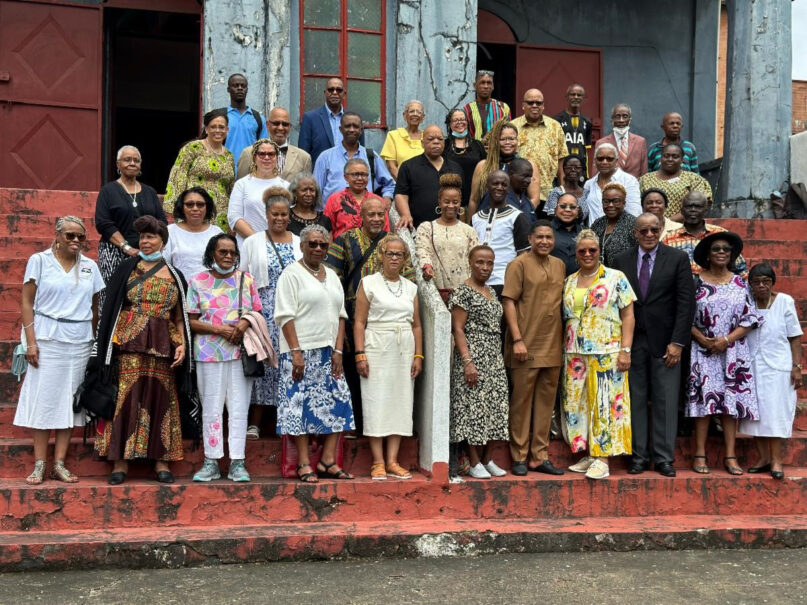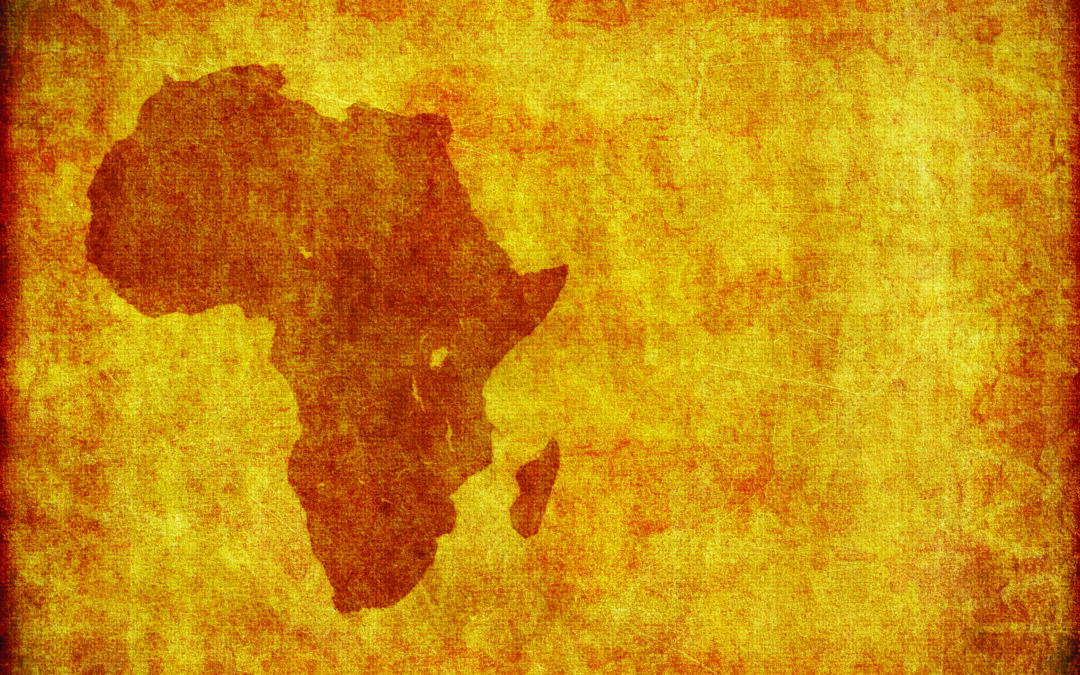
by Angelita Clifton | Dec 14, 2022 | Black History, Commentary, Headline News, Heritage |
(RNS) — Two months ago, I stood in Providence Baptist Church in Monrovia, Liberia, listening to the stories of Africans and Americans — the latter freed from slavery in the United States — who had banded together to establish the first republic on the continent of Africa two centuries before.
Providence, the oldest Baptist church in the West African country and the second oldest on the continent, was founded in 1822 by the Rev. Lott Carey, who had come as a missionary to the fledgling country and had brought a team of African American settlers home. Now, 200 years later, the Rev. Emmett L. Dunn, CEO of the Lott Carey Foreign Mission Convention, had brought a team of African Americans home.
I have traveled to several countries in Africa, and each one is imprinted on my heart in a special way. But hearing the stories of the African American settlers was cause to pause. I connected with the history of Liberia in a way I didn’t expect. I felt blessed beyond measure.
Landing in Liberia my spirit leaped like the baby in Elizabeth’s belly when greeting Mary, the mother of Jesus. The sights and sounds of Liberia greeted my senses, sending my head and my heart into overwhelming joy.
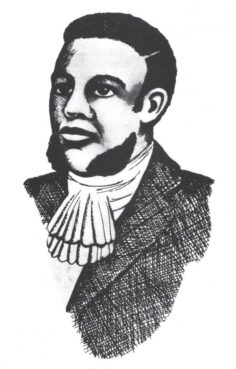
The Rev. Lott Carey. Photo courtesy of Creative Commons
In Liberia, I was at home. Home in the land of my ancestors on World Communion Sunday. Home, where a sense of “double consciousness” — a concept coined by W.E.B. DuBois to describe African Americans’ sense of dislocation from Africa and ourselves — liberated my thoughts and linked them to my theology in a free-spirited dance of deliverance.
It’s often said we must step back before we step forward. Walking in the footsteps of Lott Carey in the motherland afforded us the opportunity to do just that.
Born enslaved in 1780 in Charles City County, Virginia, Carey became a disciple of Jesus in 1807, purchased his freedom in 1813, and led the first Baptist missionaries to Africa from the United States in 1821.
After settling in Liberia, Carey and his pioneering missionary team engaged in evangelism, education and health care. He served as a missional and civic leader until his death in 1828.
Our pilgrimage relived aspects of this journey and the experiences of his team. We explored Providence Island, where Carey landed in Liberia in early 1822. Before we landed in Liberia, Dunn told us, “We expect that this journey into the past will bring home to us the love and sacrifice of those who walked this journey before us.”
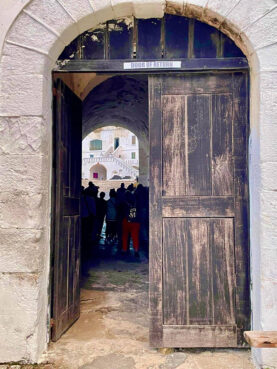
The Door of Return at the Slave Castle in Cape Coast, Ghana. It was once dubbed “The Door of No Return,” signaling the last time enslaved persons would see their homeland. Courtesy photo
Our next stop in Africa took us nearly 1,000 miles east along the coast of the Assin Manso Slave River and the Cape Coast castle in Ghana, unofficially dubbed “the Door of No Return” by our Ghanian sisters and brothers, through which so many of our ancestors were shackled and shipped into the slave trade in the New World. It has become a portal for African Americans, pulling us back to Ghana.
Before walking to the Slave River, where my ancestors received their first bath after being captured and their last bath before being carted off to the Americas, we held a ceremony of protection over Lott Carey’s life. In my sanctified imagination, my African ancestors’ prayers came to fruition in the proclamation made that day. What was meant for evil, God had used for good some 400 years later.
How ironic is it? In a whitewashed slave castle used to destroy the African spirit, a group of spirited African Americans reconnected with a long-lost history, historically whitewashed in American culture and the church universal.
My Bible says, “Be steadfast and persevering, my beloved sisters and brothers, fully engaged in the work of Jesus. You know that your work is not in vain when it is done in Jesus’ name.”
It was in that spirit that the last leg of our journey in homage to Lott Carey ended with saluting our ancestors on the same shores where they passed, returning where no return was promised. In the Twi language of Ghana, “sankofa” is a word meaning “go back and get it.” We did.
(The Rev. Angelita Clifton is president of Women in Service Everywhere and an associate minister at Fountain Baptist Church in Summit, New Jersey. The views expressed in this commentary do not necessarily reflect those of Religion News Service.)
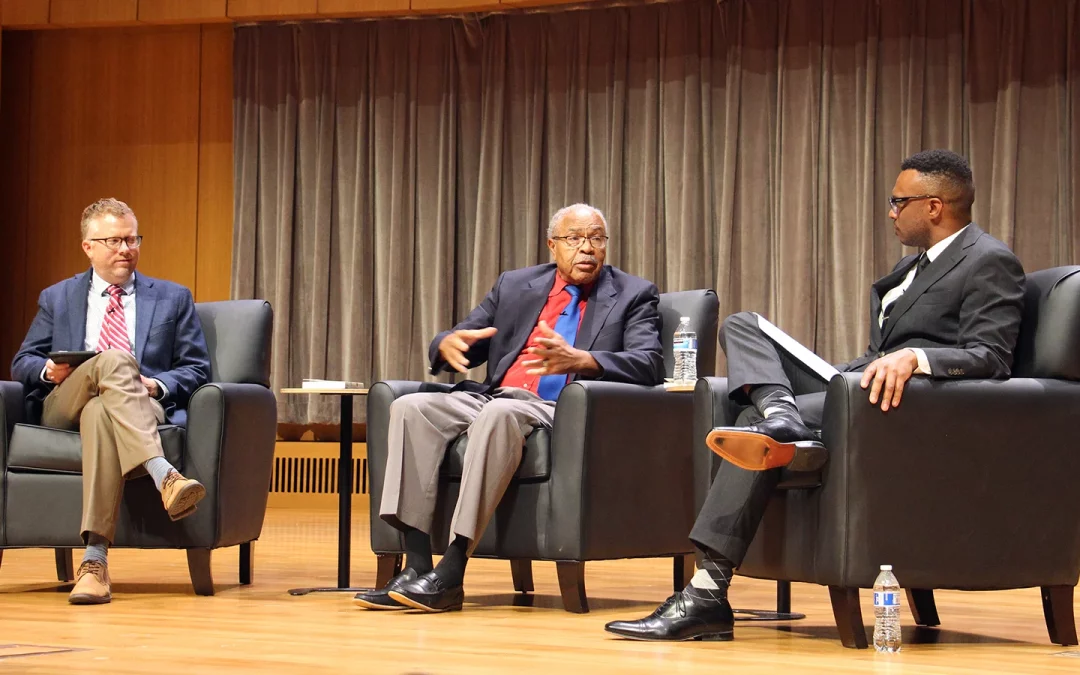
by Emily McFarlan Miller, RNS | Nov 3, 2022 | Black History, Commentary, Headline News, Heritage, Social Justice |
WHEATON, Ill. (RNS) — The Rev. Wheeler Parker Jr. still remembers clearly the moment as a teenager he thought he was going to die.
Parker was 16 years old, visiting family in Mississippi, when he woke in the early morning hours to the sound of voices in the house. Moments later, the door to his bedroom opened and a man pointed a flashlight and a pistol in his face.
He shut his eyes tight, but the shot never came.
The man moved on to the next bedroom and the next before finding and kidnapping his cousin — Emmett Till.
It was the last time he saw his best friend alive, Parker, now in his 80s, told a packed concert hall Tuesday night (Oct. 25) at Wheaton College, the evangelical flagship school in the Chicago suburbs.
What happened next — Till’s brutal murder, his mother’s decision to allow an open casket at the 14-year-old victim’s funeral, so the country could see what had been done to her son — shone a light on racial violence in the United States and became a catalyst for the civil rights movement.
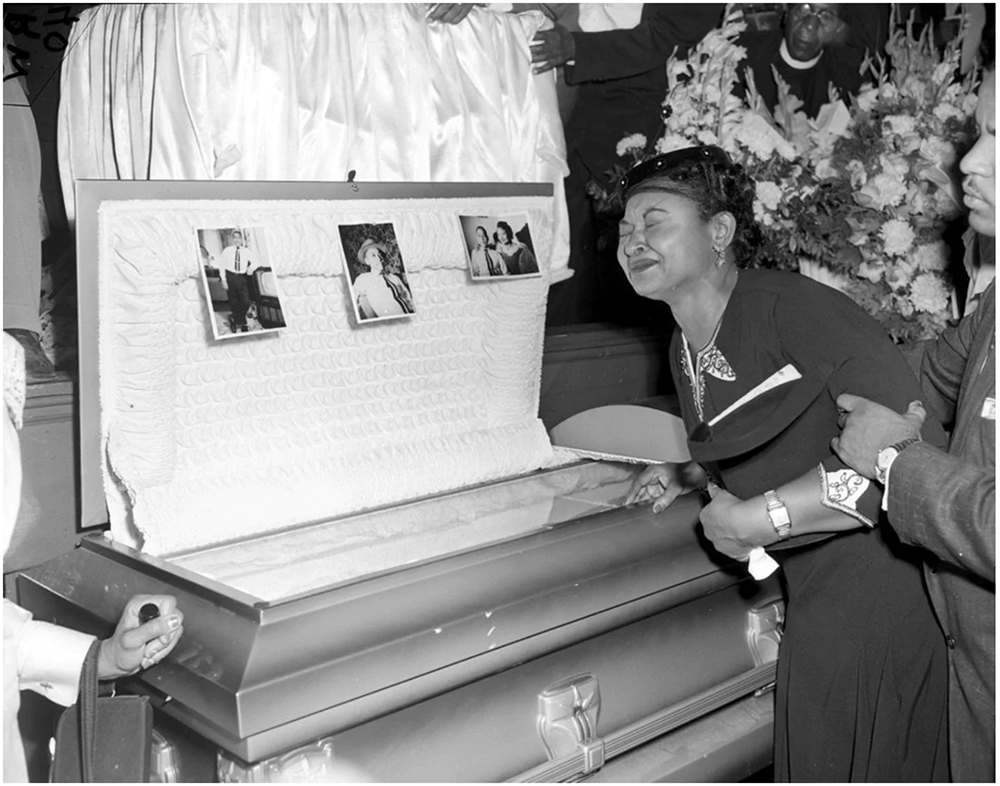
Mamie Till-Mobley weeps at her son’s funeral on Sept. 6, 1955, in Chicago. (Chicago Sun-Times/AP Photo)
“A picture’s worth a thousand words. That picture made a statement. It went throughout the world, all over the world, and it still speaks,” Parker said of the photographs of Till in his casket, taken by David Jackson and first published in Jet magazine.
The story of Till continues to resonate because it “provides us with a lens to understand racial conflict in our own moment,” said Theon Hill, associate professor of communications at Wheaton College and primary organizer and moderator of Tuesday’s event, “Remembering Emmett Till: A Conversation on Race, Nation and Faith.”
“When we see George Floyd killed right in front of us due to the officer’s knee,” said Hill, “when we see Breonna Taylor’s death, when we see Ahmaud Arbery, we’re trying to make sense of what’s happening, and Till’s death, as tragic as it will always be, provides us with a grammar to understand this is what’s happening and this is how you might respond in your moment.”
The enduring relevance of Till’s death is apparent in the Emmett Till Antilynching Act, making lynching a federal hate crime and signed in March by President Joe Biden, nearly 70 years after Till’s murder.
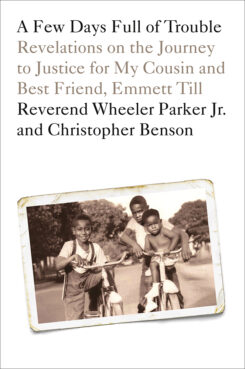
“A Few Days Full of Trouble: Revelations on the Journey to Justice for My Cousin and Best Friend, Emmett Till” by the Rev. Wheeler Parker Jr. and Christopher Benson. Courtesy image
It’s also borne out in the critical acclaim for a new film, “Till,” centering on Till’s mother, Mamie Till-Mobley, and her fight for justice for her son, which appears in theaters nationwide this week. In January, Parker will publish his recollections of his cousin, “A Few Days Full of Trouble: Revelations on the Journey to Justice for My Cousin and Best Friend, Emmett Till.”
It was 30 years before anybody asked Parker his account of what had happened over the handful of days in 1955 he and his cousin, who lived in Chicago, spent in Mississippi visiting family, according to Parker, the last surviving witness to Till’s abduction.
In Parker’s account, Till is a jokester, the boy next door he accompanied fishing, picnicking and on other trips. When his cousin found out he was planning to take the train down South to visit his grandfather, he insisted on going too.
“If you didn’t live in Mississippi at that time or experience what it was like, you have no idea what it was like,” Parker said.
He had lived in the South until he was 7 and knew “what you had to do to stay alive and what could happen to you,” he said.
Till didn’t.
When the younger boy whistled in the presence of a white woman outside a store, Parker said, the cousins left in a hurry. He worried what could happen in a place and time when a Black man couldn’t so much as look at a white woman, he said.
But days passed, and they’d nearly forgotten about the incident. Then came the moment Parker heard voices in his grandfather’s home at about 2:30 a.m. on a Sunday morning, asking about the boys from Chicago.
“Sunday morning should be the safest place on earth for a young man in his house — on Sunday morning, waiting to go to church,” he said.
Shaking and sure he was about to die, he prayed, “God, if you just let me live, I’m going to get my life together.”
That Monday, he returned to Chicago alone, his life changed “completely,” said Parker, now pastor and district superintendent of the Argo Temple Church of God in Christ in Summit, Illinois.
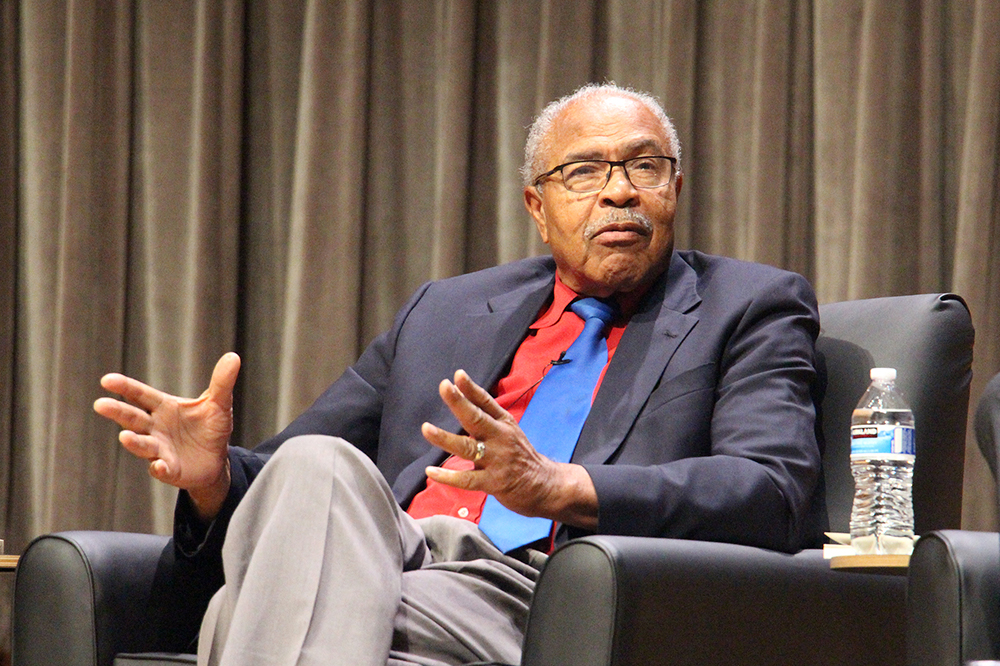
The Rev. Wheeler Parker Jr. speaks during the “Remembering Emmett Till: A Conversation on Race, Nation and Faith” event at Wheaton College, Oct. 25, 2022, in Wheaton, Illinois. RNS photo by Emily McFarlan Miller
What happened to Till changed the country, too.
Dave Tell, author of the 2019 book “Remembering Emmett Till,” told the audience Tuesday night that he had become invested in civil rights because of Till’s story.
“The Till story prompted a new generation to stand up for justice, and I think the good news of the night is that the Till story — Rev. Parker’s story — is still motivating a new generation,” Tell said.
It’s a story, he said, the U.S. needs to hear today more than ever. Considering the stories of Floyd and others against the backdrop of Till’s murder, it’s hard to minimize their killings as “a problem of a bad apple or bad cop,” he said.
And the church has a role to play in sharing that story, both Tell and Parker agreed.
The biblical Book of Genesis tells the story of Abel, murdered by his brother Cain, Tell pointed out. In the story, God says Abel’s blood cries out to him from the ground, where Cain has tried to bury what he did.
If God demands that voices that have been buried be brought to light as part of the work of justice and healing, shouldn’t the church? Tell asked.
“We’ve got to keep the legacy going — got to keep the story going — and not with animosity,” Parker added.
“Just tell the story. It’s history. It’s real. Tell what happened,” he said.
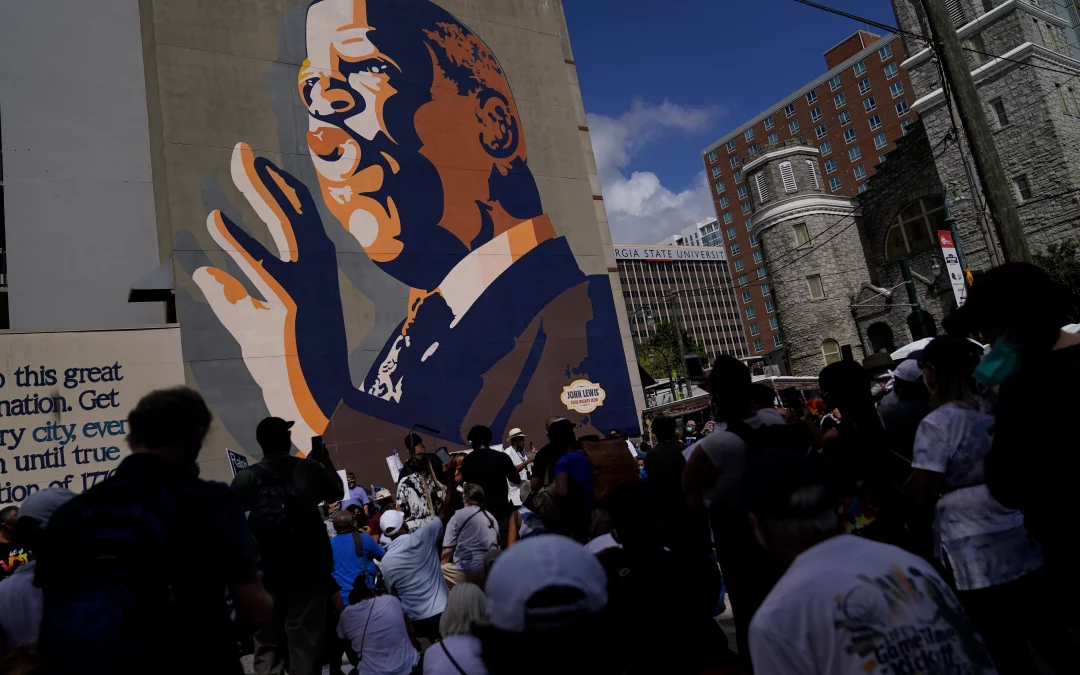
by Bridget Moix | Mar 23, 2022 | Commentary, Headline News, Social Justice |
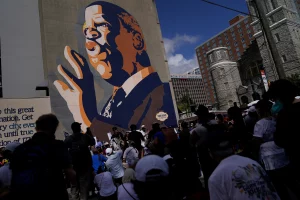
(RNS) — Millions of Texas voters headed to the polls earlier this month in the state’s primary elections — but the democratic system they participated in is markedly different from the recent past.
After last year’s enactment of sweeping voting restrictions by the Texas Statehouse, the primaries served as a first chance to see how damaging these laws would truly be. It’s too soon to get the full picture, but early signs are ominous: Roughly 30% of absentee ballots cast were rejected by election officials, a massive increase from the 2020 general election when fewer than 1% of ballots met the same fate.
Regrettably, this is likely a mere preview of what’s to come for millions of voters across the nation. In 2021, at least 19 states passed 34 laws restricting access to voting. This includes limiting mail balloting, purging voter rolls and reducing poll hours on Election Day. More than 440 bills with provisions that restrict voting access were introduced in 49 states in the 2021 legislative sessions and more are certain to come.
This isn’t just about who will or will not be able to vote in elections. When combined with the toxic partisanship that is dividing our country — and the fact that large portions of our population and numerous elected leaders still cast doubt on the outcome of the 2020 presidential election — an undeniable truth emerges: Our democracy is in deep peril.
As the first registered religious lobbying organization in the United States, we at the Friends Committee on National Legislation believe civic engagement of all people is vital to the democratic life of our country. This begins with the fundamental right to vote. Quakers and other people of faith understand that voting is not just a basic civic right but a moral requirement. At the center of our faith is the unwavering belief in and commitment to the equality and dignity of every human being. Safeguarding the integrity of the voting process for all people and removing, not raising, barriers to the full participation of disenfranchised people in our electoral process is vital to our democracy and our integrity as a nation.
What happened in Texas and in other states violates our democratic principles and our moral conscience. We know voters of color are most directly impacted by efforts to suppress their voice, both historically and today. These communities are also leading the voting rights movement, often at great personal risk. This is only the latest chapter in a long struggle against disenfranchisement of Black and brown communities in the United States. Our faith calls us to help uproot racism and discrimination wherever it exists, including at the ballot box, and to help transform our nation into the beloved community we envision.
This call to protect elections as the bedrock of democracy is not new. Earlier this year, in anticipation of Martin Luther King Day, advocates launched a large scale effort to pass the Freedom to Vote: John R. Lewis Act. This bill would revitalize American democracy by making elections more accessible, secure and transparent, and by ensuring that states do not pass discriminatory laws that restrict access to the ballot box. The effort failed due to a filibuster but has not been abandoned.
Even as Congress rightly focuses on the crisis in Ukraine and the president’s economic agenda, voting rights must remain a top priority for the nation. Currently, efforts to reform the Electoral Count Act of 1887 have real momentum in Congress, with a bipartisan group of senators working to find common ground.
This alone will not end all voter suppression, but it could be a successful vehicle for additional necessary reforms, including amendments to prevent state legislatures from overturning election results, making Election Day a holiday, supporting small-donor financing, instituting gerrymandering reforms or making absentee/vote-by-mail easier.
And despite the failed vote, senators should keep pushing for the Freedom to Vote: John R. Lewis Act. History has taught us the advancement of voting rights has never come quickly or easily — and raising the moral conscience of our nation on these issues is an important role of the faith community.
Quakers believe our democracy can live up to its potential only if the government safeguards the integrity of the voting process and ensures full participation for all people. The push for voting rights is a moral imperative and requires the urgent passage of nationwide voting rights legislation. Advocates and people of faith won’t rest until real action is taken. The Senate shouldn’t either.
(Bridget Moix is the fifth general secretary of the Friends Committee on National Legislation in its 80-year history. She brings with her more than 25 years of work in peacebuilding. Moix also leads two other Quaker organizations: Friends Place on Capitol Hill and the FCNL Education Fund. The views expressed in this commentary do not necessarily reflect those of Religion News Service.)
by Allen Reynolds, UrbanFaith Editor | Jan 19, 2022 | Commentary, Headline News |
(RNS) — On the day of a major voting rights debate on Capitol Hill, a social justice coordinator for the Progressive National Baptist Convention said fighting for voting rights is an effort to conquer evil.
“This convention practices a ministry of erosion,” said the Rev. Willie D. Francois III, co-chair of its social justice arm, during a Tuesday (Jan. 18) news conference held in Atlanta and livestreamed on the denomination’s social media.
“What does that mean? We keep showing up so that we wear evil down. The denial of voting rights is evil. The protection of Senate rules over the protection of the public is evil.”
The news conference was held at the historically Black denomination’s midwinter board meeting, just as legislators on Capitol Hill debated voting rights bills that the PNBC, along with a number of other faith organizations, support. However, the bills are not expected to pass.
Francois said the PNBC would be working with Faiths United to Save Democracy, a new coalition that has urged the Senate to change its rule about the filibuster, a stalling technique that requires 60 votes to end it and which is often used by the minority party to stop a bill from passing with a simple majority vote.
“The filibuster that was used to block anti-lynching laws cannot be used right now to block voter expansion,” Francois said. “And so we’re calling on our Senate to reform its filibuster to ensure that we can actually pass the John Lewis Voting Rights Act and we can also pass the Freedom to Vote Act.”
Regardless of what happens during the current debate, the PNBC leaders said they intend to move ahead with plans to lobby members of Congress in March and register voters weekly in their congregations and communities, aiming to increase voter rolls by 500,000.
The Rev. Adolphus Lacey, a pastor in New York’s Brooklyn borough, said these efforts will continue despite the ongoing coronavirus pandemic.
“COVID is real; COVID is a threat,” said Lacey, a PNBC social justice commissioner. “But even more serious than COVID, as real and scary as it is, is to see thousands and thousands of thousands of voters not being able to vote, and it was on our watch. We refuse to stop. We refuse to turn around.”
The denomination’s voter registration initiative will be aimed particularly at millennials and members of Gen Z.
But it will also focus on states with key races expected to have close margins, said the Rev. Darryl Gray of St. Louis.
“We don’t want to just register a half a million people,” said Gray, a PNBC pastor who served in the Kansas Senate in the 1980s and ran an unsuccessful 2020 campaign for Missouri state representative. “We want to register a half a million people in United States senatorial campaigns that are going to be consequential.”
PNBC leaders noted they belong to the denominational home of the Rev. Martin Luther King Jr., in a state at the center of voting rights debates. King co-pastored Ebenezer Baptist Church in Atlanta and his Southern Christian Leadership Conference, which was influential in the civil rights movement, also is based in the city.
“We believe it is no coincidence that this convention, born out of the need to fight for justice, is in this state and city at such a time as this when our voting rights are under fierce attack,” said the Rev. David R. Peoples, president of the PNBC.
“This is a call to action from the Progressive National Baptist Convention. We come to not just pray. We come to not just push. We come to not just preserve. We’ve come to protect the right to vote.”
READ THIS STORY AT RELIGIONNEWS.COM




